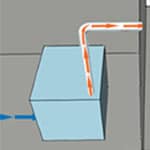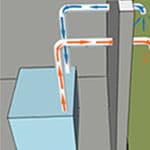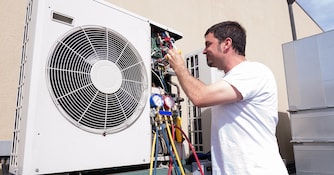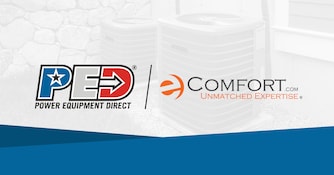
Industrial Natural Gas Unit Heater Buying Guide
In an industrial application, natural gas is one of the most common, reliable, and inexpensive fuels used to produce heat.
Now that you've selected the application and fuel for your unit heater, it's time to choose those final specifications! Below, we'll discuss different heat exchanger materials and venting options.
Â
Choosing a Heat Exchanger Material
In many cases, you will have an option of choosing between two heat exchanger materials: aluminized steel or stainless steel.
Aluminized Steel
Aluminized steel is the standard material used for natural gas heat exchangers and is known for its ability to reliably transfer heat over may years of use. If you have a standard application, aluminized steel will be perfect.
Stainless Steel
Stainless steel is a stronger, more expensive option that comes with two benefits. The first is that it will typically last longer than an aluminized steel heat exchanger, as it is able to withstand more stress over time.
Â
The second is that it can better handle corrosive elements found in factories and similar environments. If your unit heater will be exposed to corrosive chemical fumes or excessive moisture, stainless steel is the way to go.
Â
Choosing a Venting Style
Industrial natural gas heaters will need to be vented to the outdoors to prevent carbon monoxide and other combustion gasses from building up inside your work space. These unit heaters offer two primary styles of venting to choose from depending on your building's architecture and your personal preference.
Power Vented
 Rather than relying on the hot combustion gasses to naturally rise up and out of your space, power vented unit heaters use a fan to help push exhaust to the outside. This fan-assisted method allows you to vent either vertically through the roof or horizontally through the wall.
Rather than relying on the hot combustion gasses to naturally rise up and out of your space, power vented unit heaters use a fan to help push exhaust to the outside. This fan-assisted method allows you to vent either vertically through the roof or horizontally through the wall.
While power venting is a great option for many applications, it does rely on the air inside your space for the combustion process. This means you will not only be venting air you've already heated to the outside, but negative pressures can be created by drawing indoor air through the unit heater without replenishing it. This, in turn, can cause unwanted air leaks in your walls, doors, and/or windows.
Â
Direct Vented (Sealed Combustion)
 In small, tightly sealed spaces, a unit heater will quickly exhaust the air available for combustion. In such situations, a direct vented unit heater is optimal. This heater will draw outside air in for combustion, which can also increases overall efficiency, since you're not exhausting air you've previously heated.
In small, tightly sealed spaces, a unit heater will quickly exhaust the air available for combustion. In such situations, a direct vented unit heater is optimal. This heater will draw outside air in for combustion, which can also increases overall efficiency, since you're not exhausting air you've previously heated.
More importantly, you will want to use direct venting in environments containing a high concentration of airborne particles or even a small amount of combustible airborne particles. Since the intake air in direct vent systems is drawn from outdoors, you don't have to worry about these dangerous particles getting pulled into the heater and potentially causing a large explosion.
Â
Â
![[High Efficiency Unit Heater]right](https://www.ecomfort.com/images/Modine Effinity93 High Efficiency Unit Heater - LP -.jpg) High Efficiency Options
High Efficiency Options
With the invention of direct venting has come dramatic improvements in unit heater efficiency. While not all direct vented unit heaters have efficiencies over 90%, there are high efficiency options with both aluminized and stainless steel heat exchangers. If you're looking for a way to save money in the long run, this is a great option for you.
Â
Â
Still Not Sure?
Give us a call at 866-554-4328 for expert help, or click below to see all of our industrial natural gas unit heaters!





